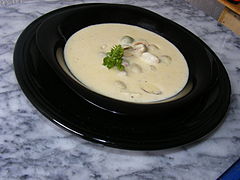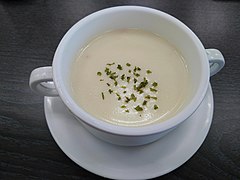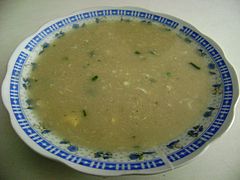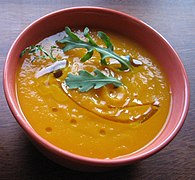Cream soup

A cream soup is a soup prepared using cream, light cream, half and half, or milk as a key ingredient.[1] Sometimes the dairy product is added at the end of the cooking process, such as after a cream soup has been puréed.[2]
A cream soup will often have a soup base, prepared with ingredients such as onion, celery, garlic powder, celery salt, butter, bacon drippings, flour, salt, pepper, paprika, milk, light cream, and chicken stock or vegetable stock.[3] Various vegetables or meats are then added to the base. Sometimes, leftover vegetables and meats are used in cream soups.[4]
List of cream soups
[edit]A multitude of notable cream soups exist, including, but not limited to the following listed below.
| Image | Name | Description |
|---|---|---|
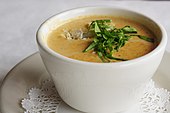 | Bisque | Heavy cream soups traditionally prepared with shellfish, but can be made with any type of seafood or other base ingredients[5] |
 | Bobó de camarão | A chowder-like Brazilian dish of shrimp in a purée of manioc (or cassava) meal with coconut milk and other ingredients.[6] |
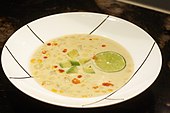 | Chowder | Often prepared with milk or cream, fish chowder, corn chowder, and clam chowder are especially popular in the North American regions of New England and Atlantic Canada. |
 | Clam chowder | Any of several chowder soups containing clams and broth, many regional variations exist, but the two most prevalent are New England or "white" clam chowder, a cream-based chowder, and Rhode Island/Manhattan "red" clam chowder, which is typically prepared without a cream base. |
 | Corn chowder | Basic corn chowder ingredients comprise corn, onion, celery, milk or cream and butter. |
 | Cream of asparagus soup | Asparagus, a light chicken or vegetable stock and milk or cream are primary ingredients.[7] |
 | Cream of broccoli soup | Primary ingredients are broccoli, stock and milk or cream.[8][9][10] Mass-produced commercial varieties of cream of broccoli soup are produced by various food manufacturers, such as the Campbell Soup Company.[11][12] |
 | Cream of chicken soup | Mass-produced in a condensed soup form, various non-commercial and homemade variations also exist |
 | Cream of mushroom soup | A simple soup where a basic roux is thinned with cream or milk and then mushrooms and/or mushroom broth are added. In America, the Campbell Soup Company began producing its well-known condensed "Cream of Mushroom Soup" in 1934.[13] |
 | Cream of spinach | With spinach as a main ingredient, additional ingredients can include onion, green onion, carrot, celery, tomatoes, potatoes, lemon juice, olive oil, seasonings, salt and pepper.[14][15] Spinach soup is typically served hot, but can also be served as a cold soup.[16][17] |
 | Cream of shrimp | Sometimes prepared as a cream soup, pictured is a shrimp chowder. |
 | Cream of tomato | Cream of tomato soup is made with tomatoes as the primary ingredient and cream or milk as an ingredient.[18] It may be served hot or cold in a bowl, and may be made in a variety of ways.[19] |
 | She-crab soup | A rich soup similar to a bisque, made of milk or heavy cream, crab or fish stock, Atlantic blue crab meat, and (traditionally) crab roe, a small amount of dry sherry added as it is plated. |
Additional cream soups include cream of cauliflower, cream of fennel, cream of potato, cream of corn, cream of walnut, cream of roasted pumpkin, cream of celery and cream-of-anything soup.[2]
Gallery
[edit]- Cream of clams soup
- Cream of corn soup
- Cream of fava beans soup
- Cream of potato soup
- Cream of roasted pumpkin soup
- Cream of rocoto soup
- Cream of walnut soup
See also
[edit]References
[edit]- ^ De Gouy, L.P. (2018). "Chapter 6: Vegetable, Poultry, Nut, and Game". The Soup Book: Over 700 Recipes. Dover Publications. pp. 145–187+. ISBN 978-0-486-83478-8. Retrieved July 21, 2019.
- ^ a b Lam, Francis (March 5, 2011). "How to make cream-of-anything soup". Salon. Retrieved July 21, 2019.
- ^ Child, J. (2010). Julia's Kitchen Wisdom. Knopf Doubleday Publishing Group. pp. 8–13. ISBN 978-0-307-59353-5. Retrieved July 21, 2019.
- ^ Goudiss, C.H.; Goudiss, A.M. (1918). Foods that Will Win the War: And how to Cook Them. World Syndicate Company. pp. 106–108. Retrieved July 21, 2019.
- ^ Simmons, M.; Williams, C.; Kauck, J. (2005). Williams-Sonoma Mastering: Soups & Stews. Williams Sonoma mastering. Free Press. pp. 105–107. ISBN 978-0-7432-6736-6. Retrieved July 21, 2019.
- ^ Danny Palmerlee (1 March 2007). South America on a Shoestring. Lonely Planet. p. 402. ISBN 978-1-74104-443-0.
- ^ A Complete Course in Canning. 1906.
- ^ De Gouy, Louis P. (1974). The Soup Book: Over 800 Recipes. New York: Dover. pp. 145–146. ISBN 978-0-4861-4449-8 – via Google Books.
- ^ Hanson, BJ; Hanson, Jeanne (2008). The Everything Soup Cookbook. Avon: Adams Media. p. 85. ISBN 978-1-6055-0571-8 – via Google Books.[permanent dead link]
- ^ Gisslen, Wayne; Griffin, Mary Ellen (2006). Professional Cooking for Canadian Chefs (6th ed.). Hoboken, NJ: John Wiley & Sons. p. 225. ISBN 978-0-4716-6377-5 – via Google Books.
- ^ "Winning Recipe May Change President's Vote on Broccoli". Beaver County Times. October 30, 1991. p. C4. Retrieved September 8, 2014 – via Google News.
- ^ "Campbell's Cooks Up Another Winner". Deseret News. Salt Lake City, UT. October 9, 1990. Retrieved September 8, 2014.
- ^ Hoffman, S.; Wise, V. (2013). Bold: A Cookbook of Big Flavors. Workman Publishing Company. p. 63. ISBN 978-0-7611-3961-4. Retrieved July 21, 2019.
- ^ "The Fountain on Locust's Cream of Spinach Soup". St. Louis Post-Dispatch. January 12, 2016. Retrieved March 20, 2017.
- ^ "Savory Cream of Spinach Soup". Mother Nature Network. December 5, 2014. Retrieved March 20, 2017.
- ^ Child, Julia (2012). Mastering the Art of French Cooking. Knopf Doubleday Publishing Group. p. pt58. ISBN 978-0-307-95818-1.
- ^ Molokhovets, E.; Toomre, J. (1998). Classic Russian Cooking: Elena Molokhovets' a Gift to Young Housewives. Indiana-Michigan Series in Russian and East European Studies. Indiana University Press. p. 589. ISBN 978-0-253-21210-8.
- ^ Harland, G.; Craxton, S.L. (2009). Tomato: A Guide to the Pleasures of Choosing, Growing, and Cooking. DK Publishing. p. 146. ISBN 978-0-7566-5720-8. Retrieved July 21, 2019.
- ^ Herbig, Paul A. (1998). Handbook of Cross-Cultural Marketing. Binghamton, NY: International Business Press. p. 45. ISBN 978-0789001542.
Irish and Italians prefer creamy tomato soup, Germans want rice, and Colombians want spice.
